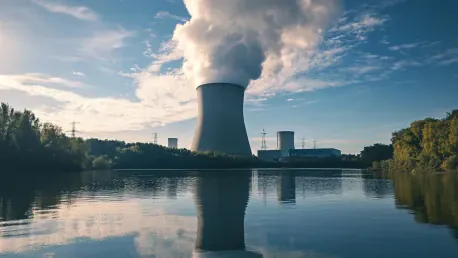In a world increasingly dominated by data and digital technologies, the energy demands of data centers, especially those driven by AI applications, are surging to unprecedented levels. Companies are under pressure to find sustainable energy solutions to power these facilities. Oracle and AWS are leading the charge by exploring nuclear energy as a viable option, aiming to manage the enormous electricity consumption their data-centric operations require. This trend is not just about meeting growing energy needs; it’s also about addressing environmental concerns and ensuring long-term sustainability.
The push towards nuclear energy, particularly through small modular reactors (SMRs), marks a significant shift in the tech industry’s approach to powering data centers. Oracle’s announcement to power a new gigawatt data center with three SMRs signifies a pivotal moment in this transition. It underscores the efficiency and compactness of these reactors, making them an attractive option for companies looking to balance energy demands with environmental impact. At the same time, AWS’s efforts to integrate nuclear power underline the potential of this technology to redefine how tech giants approach sustainable energy solutions.
Strategic Moves Towards Nuclear Energy
Tech giants like Oracle and AWS are increasingly turning to nuclear energy to fulfill the escalating energy requirements of their data centers. Oracle’s ambitious project involves powering a new gigawatt data center with three SMRs, positioning nuclear power as a forward-thinking solution. These small modular reactors are favored for their efficiency and compact design, which makes them suitable for managing the heavy energy demands typical of data-intensive operations. The move also highlights the industry’s growing recognition that traditional energy sources may no longer suffice to support the future of data centers.
On the other side, AWS’s endeavor to harness nuclear power has faced opposition from utility companies such as American Electric Power and Accelo. These entities argue that adopting nuclear energy could inevitably lead to increased power bills for taxpayers, creating a contentious debate on the best path forward. Despite these challenges, the push for nuclear energy reflects an urgent need to explore all possible avenues to accommodate the voracious energy appetites of modern data centers. As technology evolves and data requirements escalate, the tech industry is at the forefront, paving the way for nuclear power as a cornerstone of energy strategy.
Transitioning to Renewable Energy Solutions
While nuclear energy offers one pathway, renewables also play a critical role in the future of data center power. Companies are increasingly investing in wind, solar, and other renewable energy sources to diversify their energy portfolios and reduce carbon footprints. This strategy is not only a response to the immediate energy needs but also a proactive approach to mitigate the environmental impact of expanding data centers. The adoption of renewable sources helps tech firms align their operations with global sustainability goals, demonstrating a commitment to environmental stewardship.
The rise of power-hungry generative AI amplifies the urgency for sustainable energy solutions. Studies predict that data center carbon emissions could skyrocket to 2.5 billion tons by 2030. Against this backdrop, the integration of renewable energy becomes even more critical. Companies are exploring innovative methods to harness renewable sources efficiently, thereby curbing carbon emissions and ensuring that the demands of cutting-edge technologies do not come at the planet’s expense. This dual strategy of leveraging both nuclear and renewable energies showcases the tech industry’s comprehensive approach to addressing its complex energy challenges.
Gen Z and the Changing Workplace Dynamics
The energy demands of data centers aren’t the only pressure points for tech companies; evolving workplace dynamics also present new challenges. Gen Z workers, in particular, show a marked preference for hybrid work arrangements, valuing the balance between professional duties and personal life. According to a survey by FDM Group Business Consultancy, three-quarters of Gen Z employees favor this work model. This trend highlights a shift in workplace culture that companies must adapt to, balancing energy efficiency and workforce satisfaction.
Interestingly, many Gen Z workers are also keen on returning to offices to leverage mentoring opportunities and career advancement, driven by interactions with senior peers. This perspective contrasts with the assumption that remote work wholly suffices for professional growth. As a result, there is a growing rebellion against exclusive remote work—this time instigated by employees rather than policymakers. Companies navigating this landscape must consider both the environmental impacts of their energy choices and the workplace preferences of a new generation, demonstrating that the future of work and energy are interconnected issues demanding holistic solutions.
Balancing Sustainability and Advancement
In our increasingly data-driven world, the energy demands of data centers, particularly those powered by AI, are reaching unprecedented heights. To meet this demand sustainably, companies are exploring alternative energy solutions. Oracle and AWS are spearheading this effort by investigating nuclear energy as a feasible option to fuel their data-intensive operations. This shift reflects more than just a response to rising energy needs; it’s also a commitment to addressing environmental concerns and achieving long-term sustainability.
The move towards nuclear power, especially through the use of small modular reactors (SMRs), signifies a pivotal change in how the tech industry powers its data centers. Notably, Oracle’s plan to power a new gigawatt data center with three SMRs marks a critical juncture in this evolution. This approach highlights the reactors’ efficiency and compact nature, making them an appealing choice for firms aiming to balance energy demands with environmental responsibility. Similarly, AWS’s initiative to incorporate nuclear power showcases the promise of this technology to revolutionize sustainable energy solutions for tech giants.









